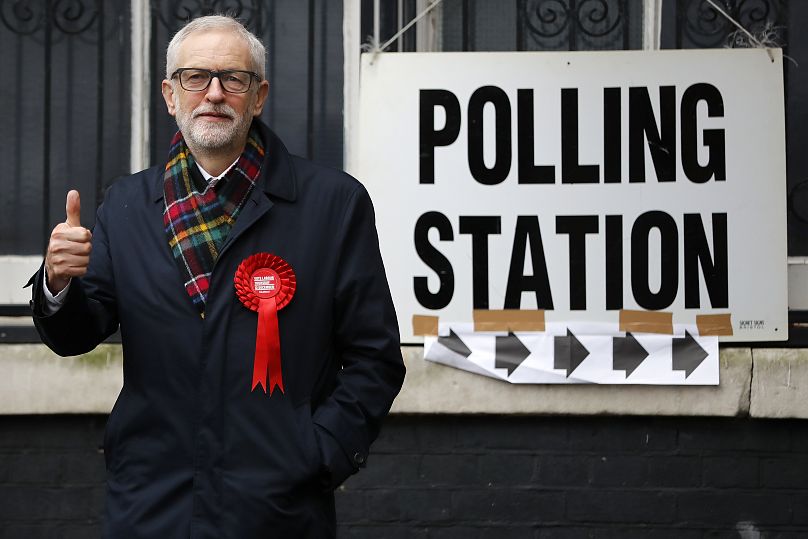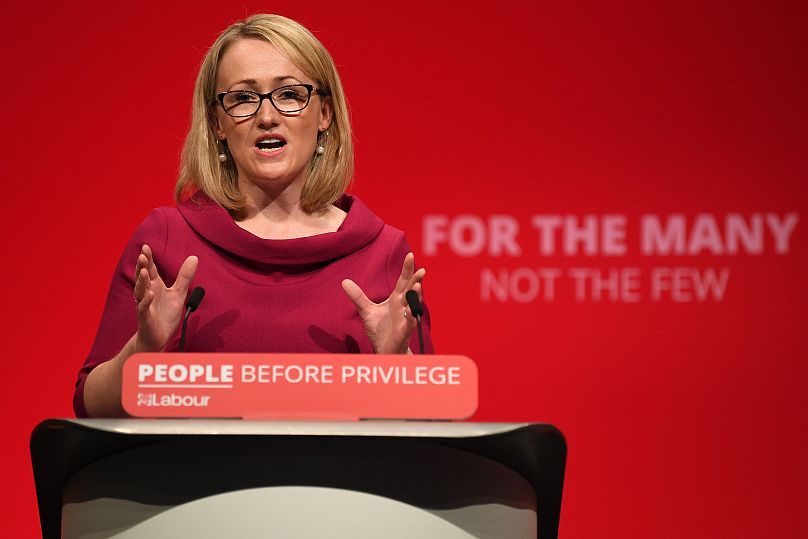The party's Corbyn faction and centre-left wing are engaged in an all-out war over what the future of the party should be.
Britain's Labour is the latest traditional left wing party from across Europe to be severely routed in elections.
But, while the centre-left appears to be slowly rising from its ashes on the continent, Labour's heaviest defeat in more than 80 years has led to some wondering if it is all but finished.
Election results were still rolling in last Friday (December 13) when the party — the main opposition to Boris Johnson's Conservatives — descended into civil war.
The party, founded in 1900, had just been handed its most humiliating result since 1935, losing 60 seats, including some in working-class areas in Wales and the Midlands that it had held for decades.
Supporters of leader Jeremy Corbyn laid the blame squarely on Brexit, arguing that voters, exasperated by more than three years of political deadlock over the country's departure from the European Union, had been won over by the Conservatives' relentless "Get Brexit Done" campaign.
Critics of the leader, however, pointed the finger at Corbyn himself, accusing him of having lurched the party too far to the left, mishandled an anti-semitism scandal and flip-flopped too long on Brexit.
Corbyn announced he would step down in March once a successor has been appointed, triggering an all-out war over what the future of the party should be.
'A disaster'
For experts, both sides of the Labour civil war have legitimate arguments.
Iain Begg from the London School of Economics told Euronews that Labour's drubbing stems from the party's "pretty confused" Brexit message but also Corbyn, who "was seen as a disaster".
"Commentator after commentator has emphasised that when they were trying to persuade voters, Corbyn kept coming up as a strong negative," he added.
Ditto for Dominic Walsh, a policy analyst at the Open Europe thinktank.
"Initial polling suggests it was a combination of several things: dislike of Jeremy Corbyn's leadership — alienating both Leave and Remain voters on Brexit — and a sense that many of their manifesto commitments were unrealistic," he wrote in an email to Euronews.
But both also stressed that Labour's troubles are not new.
"Many of the seats they lost in the North and the Midlands had been trending away from the party for decades, but this trend was accelerated by Brexit to the benefit of the Conservatives," Walsh noted.
As such, it is no longer a straight-forward case of the working class voting Labour while middle-and-upper class voters favour the Conservatives, Begg said.
"Labour is now very much a middle-class, metropolitan party based on public service professionals and much less the archetypal miner or steelworker," he continued.
All-out war
Corbyn almost stumbled into his current role by accident. When Labour lost the 2015 general election, a leadership contest was organised and Corbyn, who had been a backbencher since 1983, scraped together the 35 MPs' signatures needed to run.
Despite being considered the race's dark horse, Corbyn's brand of socialism - much like Bernie Sanders in the US - soon caught traction among the young, working-class and unions. Spooked, Labour's centre-left wing rallied together with former prime ministers Tony Blair and Gordon Brown as well as leading figures including Alastair Campbell and David Miliband warning that his leadership would be fatal to the party.
Members, however, backed him in the first round with more than 59% of votes.
The centre-left, progressively pushed to the margins of the party as his leadership unfolded, also had to swallow their pride when Labour surged in the 2017 snap election to deprive Conservative Prime Minister Theresa May of a majority.
Now, though, the centre-left faction is out for blood.
In a sign that the leadership contest will be a tumultuous one, Emily Thornberry, the shadow foreign secretary who launched her leadership bid on Wednesday, has threatened to sue former colleague Caroline Flint, who lost her seat last week, for "making sh*t up" about her.
Thornberry, who has so far steered clear of outwardly criticising Corbyn, wrote in the Guardian piece she penned to declare her candidacy, that to fight back, Labour should "certainly not have some great ideological battle between left, right and centre" or between north and south or Leave/Remain lines.
"Where is the strategic thinking in our party? Who has a proper plan for the future?," she went on, praising the 1994 New Labour movement of Tony Blair for its "deep political insight and absolute clarity of purpose".
Others believed to throw their hat in for the leadership include Corbyn ally Rebecca Long-Bailey, shadow Brexit secretary Keir Starmer, shadow education secretary Angela Rayner and Jess Phillips, a backbencher who has been critical of Corbyn.
Corbyn's Labour here to stay?
Recent polling appears to suggest that anyone too closely associated with Corbyn would struggle to win the leadership contest.
A YouGov poll found for instance that 71% of the electorate had an unfavourable opinion of the departing Labour leader. This held true for 52% of Labour respondents.
A second survey also found that most people — 44% — would prefer the next Labour leader to be more centrist than Corbyn is.
But it's not that clear cut.
"The Cobynistas," Begg explained, "have gained control of the mechanisms of the Labour Party and the mechanisms of the Labour Party have always been important in determining both who wins leadership elections and what the manifesto is."
Corbyn is backed by the powerful grassroots Momentum pressure group, which has gained control of the party's National Executive Committee and called for party members to be able to select or deselect MPs. They've primarily targeted seats with Labour MPs who had openly criticised Corbyn or defied the whip.
"It means that it will be hard to dislodge that faction within the party," Begg said. "And this is where the likely process will be that there's a contrast between the irrealism of those hard lefties and the realism of those who think Labour's primary task should be to find a way back to power.
"It doesn't seem very auspicious for the centre-left or social-democratic faction within the Labour party," he went on.
Walsh also highlighted that "much of the membership, which elects the leader, is largely of a "Corbynite" persuasion. It is unclear whether Labour will necessarily learn the right lessons from their election defeat."
Labour's recovery
"One advantage they do have is time — with the next election not till 2024 and Parliament certain to pass the Withdrawal Agreement Bill, they don't need to rush into any decisions," Walsh wrote.
Begg adopted a more cautious tone.
Momentum-backed Rebecca Long-Bailey, should she run for the leadership, is expected to win and continue in Corbyn's lineage.
With her at the helm "it's going to be the same contest. It's electability against success inside the Labour Party that's the strong issue," he said. "I think the prospect of them being viable in 2024 (...) are pretty slender unless something goes badly wrong."
But writing off the 119-year-old political formation altogether would be a mistake. "There are strong echoes to what happened to the Labour party in the early 1980s when it similarly perished on an extreme manifesto with a very weak leftie leader and then gradually came back to power," Begg said.
The final nail in the European centre-left's coffin?
In some ways, Labour's internal battle between the centre-left and the left flank is reminiscent of what's happening elsewhere across the Old Continent.
In France, the Socialist party is all but threatened by extinction after scoring abysmally in the 2017 presidential election and 2019 European elections with candidates from its left. The far-left La France Insoumise party, however, has surged.
In Italy, the centre-left Democratic party only found itself back in government as part of a coalition with the populist MS5 (Five-Star Movement) after a gamble by the far-right League party backfired. In Portugal and Spain, the centre-left Socialist parties have fought their way back to power but have to rely on smaller far-left parties to govern as is the case in Denmark and Finland.
Germany's centre-left SPD, in a ruling coalition with Angela Merkel's centre-right CDU/CSU, is shedding votes to the Greens and the Die Linke (The Left).
But drawing conclusions about the European centre-left slow-but-inexorable death is arduous and holding up Labour's thumping defeat as the latest proof even more so.
"The context of Brexit and the first-past-the-vote voting system means elections in the UK are unique," Walsh stressed. "It is worth remembering that Labour's strong performance in 2017 was then interpreted as bucking the trend of wider decline for European social democracy."
"There's a range of things that affecting this," Begg said. "I think the specifics of each country do have to be examined."
He also noted that "given that Labour was not running on a social-democratic platform, you have to be careful about making these comparisons".













